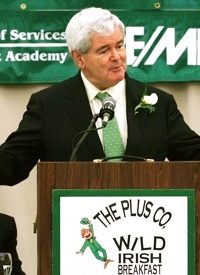
Newt Gingrich, who made a much publicized visit to New Hampshire in his heyday as the nation’s Speaker of the House 16 years ago, when he was allegedly looking for moose, may already be hunting for votes in the state that holds the first presidential primary every four years.
Gingrich in recent months has become a familiar sight in the key early caucus and primary states of Iowa, New Hampshire, and South Carolina, was back in New Hampshire Monday, and the one-time college professor seemed in his element as he fielded questions from students and friends of Saint Anselm College Monday at the college’s New Hampshire Institute of Politics. The former speaker made no formal announcement of a presidential bid, but the did say he would be announcing his plans soon. No one believes he is making repeated visits to this and other key states in the nominating process to prepare voters for the news that he has decided the country doesn’t need him after all. In a holding area behind the stage on which he stood to speak and take questions for nearly an hour, Gingrich confided he is “99 percent” certain that he will make the run for the oval office.
If he does, he will likely be part of a crowded field and will surely be among the top tier of candidates in name recognition, and for the political connections he established in almost 20 years in the U.S. House of Representatives, the last four of them as speaker. Gingrich is remembered for both his early days in the House, when he gained a reputation as a back-bench verbal bomb thrower, and for his leadership in 1994, when the then-House Minority Leader managed to turn the mid-term election into a national referendum on the Clinton administration, and harnessed resentment over the administration’s tax hikes and its “HillaryCare” national health care proposal into the “Tsunami” that swept in a Republican Congress for the first time in 40 years and left Bill Clinton protesting that “the President is still relevant.” Clinton recovered sufficiently to defeat Kansas Sen. Bob Dole and win reelection in 1996. But the President was, to some extent, hamstrung by having to deal with the Gingrich-led Republican Congress for six of his eight years in the White House. By trimming his ideological sails, however, Clinton cemented his own popularity with independent voters and managed to work with the congressional Republicans to achieve welfare reform and deficit reduction. Clinton’s second term was marked by budget surpluses, an assertive military policy and, overshadowing both, a sex scandal that led to his impeachment by a Republican House and acquittal by a Republican Senate.
While Clinton was politically popular, even while personally stigmatized by his conduct in the Oval Office, Gingrich has personal baggage of his own to deal with, including two messy divorces and affairs concurrent with his marriages. He has since entered into a third marriage and has converted to Catholicism, which, as the neoconservative journal, National Review noted, may gain him points in Heaven, “but there are no primaries there.” And his personal life may become an issue if rivals who take the plunge are as uninhibited on the subject as rookie Senator Rand Paul, Republican of Kentucky. Speaking at a Congressional Correspondents’ dinner last week, Paul turned from the lighthearted banter to take a potentially bloodletting stab at Gingrich’s serial monogamy.
“I was happy to see that Newt Gingrich has staked out a position on the war; a position or two, or maybe three,” Paul said, in an apparent reference to the U.S. and NATO intervention in the civil war in Libya. “I don’t know. He may have more war positions than he’s had wives.” Paul has hinted he may enter the presidential race himself if his father does not. The Kentucky Senator is the son of Rep. Ron Paul, a Texas Republican and a 2008 presidential hopeful. The elder Paul, who has gained publicity for his strong antiwar and non-intervention stands and for his crusade against the Federal Reserve Board, has also visited New Hampshire and Iowa recently and has said he is considering another run for President in 2012.
The discussion at Saint Anselm College centered on policy, rather than personal issues, as Gingrich gave a brief talk for roughly ten minutes and spent the remainder of the hour fielding questions and comments from the audience. In response to a comment from one resident, who said the United States should go to war with Iran, Gingrich said that while he believed regime change should be America’s goal in Iran, he believed it could be achieved by non-military means, through economic and diplomatic pressures. When the same audience member said Republicans should make clear that the three wars America is fighting in the Middle East are really part of the one “war on terror,” Gingrich replied that he had already been referring to it that way.
“You should at least give me credit for using the language you want,” he responded good-naturedly. But he warned that Pakistan poses a serious threat to the United States and world peace. That neighbor of Afghanistan may have as many as 100 nuclear bombs, he said.
“If Pakistan disintegrates, you’re going to have a nightmare the following morning,” he warned.
On budget issues, the Speaker who had a budget showdown with President Clinton leading to a partial government shutdown in 1995, agreed with the audience member who said what the Democrats and “lame stream media” describe as budget cuts are really smaller increases than what the President and his party would like. Gingrich characterized the budget alternatives so far as “the difference between too much and absurdly too much” spending.
On welfare, Gingrich said there were better ways to help the needy than to perpetuate a culture of dependency, saying the poor need jobs, not handouts. “All the great philanthropists have said, don’t give money to the poor,” Gingrich said. Without going into specifics, the former speaker said, he would like to have a national conversation on the question: “How do we offer the right to pursue happiness in every community in the country.”
Gingrich lingered for a while to autograph books and other memorabilia and said he enjoyed the question and answer format. Just before leaving for the western part of the state for a luncheon with Cheshire County Republicans in Keene, he answered a question from The New American about whether President Obama needed authorization from Congress to take military action in Libya. Gingrich said he believed it was not necessary, since the President’s powers as commander in chief “are broadly defined.” Asked if James Madison did not say the Constitution had vested the question of war in the legislative, rather than the executive branch, Gingrich said, “Yes, but he also, as Secretary of State, teamed with Thomas Jefferson to send Marines to Tripoli without congressional authorization.”
Photo: Former Speaker Newt Gingrich speaks during a Wild Irish Breakfast in Nashua, N.H. Thursday, March 17, 2011: AP Images



